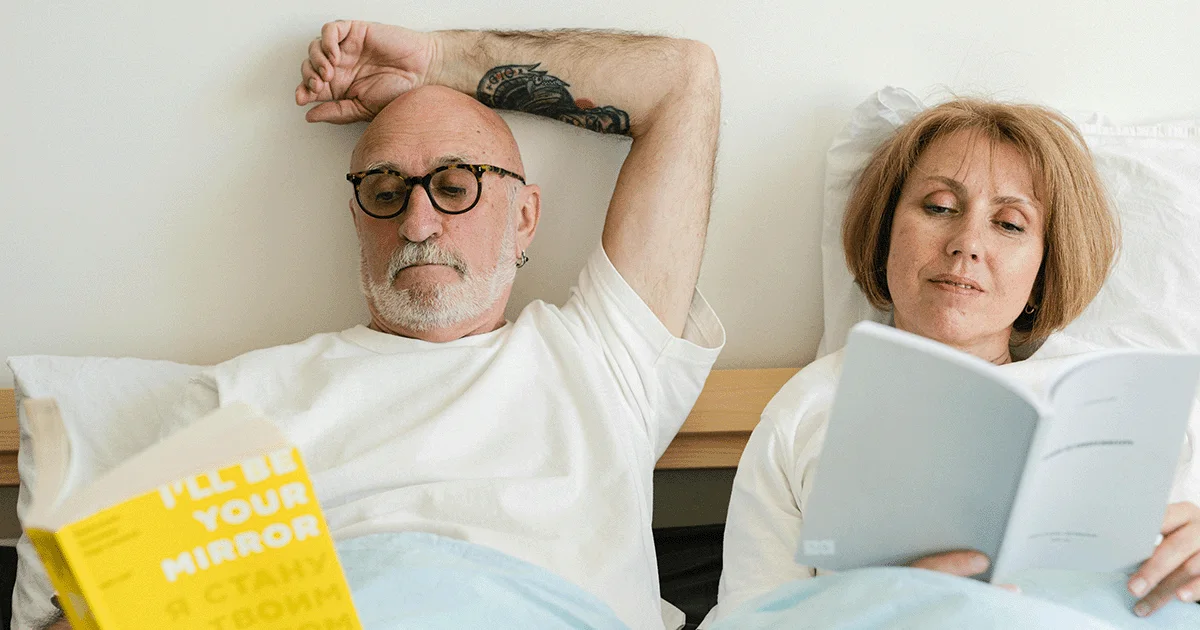Key takeaways
Sex drive, or libido, varies among individuals and can fluctuate throughout your life.
A high sex drive can be caused by various factors, including hormonal changes, new medications, and lifestyle habits, such as an increase in exercise.
While a high sex drive isn’t usually cause for concern, it can become a problem if it starts to disrupt daily functioning as well as mental and physical wellbeing.
Here's what we'll cover
Here's what we'll cover
Here's what we'll cover
Key takeaways
Sex drive, or libido, varies among individuals and can fluctuate throughout your life.
A high sex drive can be caused by various factors, including hormonal changes, new medications, and lifestyle habits, such as an increase in exercise.
While a high sex drive isn’t usually cause for concern, it can become a problem if it starts to disrupt daily functioning as well as mental and physical wellbeing.
So, you’ve been thinking about sex lately—a lot. Every day, every hour, or maybe every few minutes, the thought of sex flits through your mind. And you may very well start to wonder, “Why is my sex drive so high?” and “Is it ‘normal’ to think about getting it on this much?”
The short answer: Yes. Similar to other basic instincts like hunger, a strong desire for sex is just part of being human. You should never feel guilty, bad, or shameful about wanting to engage in sexual activities; it’s a commonality shared between billions of people. Plus, a boost in libido is completely normal; sex drive can (and often does) fluctuate throughout the course of your life and as a result of many factors.
Ahead, we explore the meaning of a high sex drive and explain the potential causes of a boosted libido and when it might be worth consulting a healthcare provider or mental health professional.
What is a high sex drive or libido?
Your sex drive, also called libido, is your desire for or interest level in sexual activity. This can include sexual activity with a partner or masturbation.
No one has the exact same body, hormone levels, or lifestyle habits—all of which are factors that can impact sex drive. Meaning, no one has the same libido, either. Some people may think about sex every hour, while others may not think about it at all—and either scenario is perfectly normal.
Libido also isn’t something that’s congenital or stagnant; it can fluctuate throughout your life and evolve over time based on various factors. There may be periods where you experience low libido (i.e. little-to-no interest in sexual activities) or high libido (i.e. wanting it anywhere, anytime, any place—or at least thinking about it anywhere, anytime, any place). While having a high sex drive is rarely a bad thing, if it’s causing you or a partner distress, it could fall into the category of hypersexuality, a condition characterized by intense, uncontrollable sexual thoughts, urges, or behaviors that disrupt or interfere with everyday life.
Is there a “normal” sex drive or libido?
There’s really no such thing as a “normal” sex drive. A high libido might be normal for one person, while a low libido could be the usual for another. Basically, you define your normal when it comes to sex drive.
That said, many factors can impact sex drive, including age. Studies show that, generally, libido decreases with age in both individuals assigned female at birth (which we will refer to as women) and those assigned male at birth (which we will refer to as men). Though there is no “set” age at which sex drive starts to decline in men, it may be linked to the onset of menopause in women.
As mentioned, the only time libido (whether low or high) is cause for concern is if it’s negatively impacting relationships, work, mental health, or overall quality of life.
Causes of high sex drive
Maybe you’ve found yourself wondering, “Why am I so horny?” for quite some time. Or perhaps you’ve only recently started asking that question. Either way, you want to know what might be behind your consistently high or suddenly surging sex drive. Here are some of the main causes.
Hormone changes
It’s well known that hormones can play a major role in a person’s sex drive. During puberty, testosterone levels in young men significantly increase. Testosterone is a sex hormone that plays a key role in—you guessed it—sex drive. In many cases, higher testosterone levels can result in a higher sex drive. On the flip side, low testosterone (or low T) can significantly reduce sex drive and impact erectile function in some people. Some men with low T, however, may have a strong sexual desire, likely when the amount of testosterone is the highest they’ve ever experienced.
So, testosterone levels tend to be one of the first things a healthcare provider checks if you’re experiencing low libido or sexual problems like erectile dysfunction (ED). But there is not always a hormonal cause for changes in libido and sexual interest. If you’re experiencing feelings that are way out of normal for you, always consider talking to a health professional to see if there might be something else going on.
Improved mood
Your stress levels and overall mental health affect every aspect of your life, including your sex life. You may have even experienced it yourself. When things are on track—maybe work is going well, you got a new puppy, or there’s a tropical vacation in your future—you might feel like spending more time in the bedroom.
Long- or short-term mental health issues, including anxiety, depression, and stress, have been shown to impact sex drive and also contribute to health conditions such as ED. Stress, for example, releases cortisol, a hormone that can hamper testosterone production and, therefore, may impact sex drive. If life is feeling pretty good lately and you’ve noticed a boost in libido, less stress could be a contributor.
Increased exercise
Regular exercise has all sorts of benefits for overall health, including a boost in libido, which can be the result of many physiological and psychological effects.
Hormonal changes. Physical activity has been shown to increase testosterone levels in the body, and as mentioned above, higher testosterone levels have been linked to a higher sex drive. It’s also been shown to reduce stress levels
Enhanced blood flow. Exercise improves circulation, which can increase blood flow to the genitals. This effect can enhance arousal and sensitivity.
Reduced stress. By triggering the release of endorphins, moving your body can reduce stress, which can positively affect sexual desire. Think: The less stressed you are, the more likely you are to be in a better mood, relaxed, and, in turn, to be interested in getting it on.
Improved body image and confidence. Working out consistently can often lead to a more positive perception of your body, boosting self-confidence. This improved self-assurance can increase your comfort in intimate situations, which, in turn, may fuel your sex drive.
That said, excess exercise may have the opposite effect; marathon runners, for example, have been found to have lower sex drives and lower levels of testosterone.
Medication
Sex drive is always a good thing to ask about whenever you start a new medication. That’s because certain prescription drugs can have sexual side effects, such as reduced libido. For example, some people experience a dip in sex drive when taking selective serotonin reuptake inhibitors (SSRIs), a type of antidepressant. Interestingly, SSRIs can also cause a significant decrease in testosterone levels for men.
On the other hand, other antidepressants, such as bupropion, may improve sex drive for some individuals. If you’re experiencing sexual dysfunction or low libido due to anxiety, successfully treating the underlying mental health challenges with medication could result in a higher sex drive.
Relationship status
Whether you’ve experienced it personally or heard about it, say, through a friend, you’re likely familiar with the “honeymoon phase” in a relationship. During that early period of courtship, it can feel like everything is new, fresh, and exciting—and so, you can’t seem to keep your hands off one another. In other words, sex is on the menu—or at least on your mind—all the time.
Just because the honeymoon phase is a potential reason for a skyrocketing sex drive doesn’t mean that longer-term relationships can’t be a cause, too. In fact, research has found that the intimacy and feelings of closeness that come with long-term bonds can increase sexual desire.
Can your sex drive be “too” high?
In many cases, having a high sex drive can be a good thing. However, there are instances in which it can be problematic. For example, people with hypersexuality may have trouble maintaining relationships or day-to-day responsibilities due to intense, recurring sexual thoughts and uncontrollable urges.
Keep in mind that there’s no “high libido test” you can get at a healthcare practitioner’s office. Your sex drive is based on what’s “normal” for you. If you start to notice significant changes in your libido that are interrupting your quality of life or causing issues in your relationship, consider consulting a healthcare or mental health professional.
Here are some signs that sex drive might be “too” high or has become problematic:
You’re engaging in risky behaviors like having unprotected sex with multiple partners
You’re having trouble maintaining work or daily activities
You don’t feel satisfied after sex or always want more
You are not able to control your sexual thoughts, fantasies, or behaviors
Your relationships are being negatively impacted (i.e. cheating on a partner, not being able to engage in or maintain romantic relationships)
You become secretive or start experiencing emotions like guilt, shame, anxiety, and depression about your sexual desires and behaviors
How to lower sex drive or libido
While it might be obvious, the easiest way to lower a high sex drive is to engage in consensual sexual activity. That said, if you’re worried about your sex drive or are experiencing any of the above symptoms, your best bet is to reach out to a healthcare or mental health professional. Depending on your circumstances, they may recommend therapy, medication, or a combination of both to address hypersexuality in its various forms.
Having a high sex drive—even a really high sex drive—doesn’t necessarily mean you need therapy. However, talk therapy on your own or with a partner can be beneficial in certain situations, such as in the case of mismatched sex drives. Also known as sexual desire discrepancy, this issue arises when partners have significantly different levels of sexual desire; it can lead to frustration, feelings of rejection, or a sense of imbalance in the relationship. Therapy can allow individuals a safe space to openly and safely discuss these differences, and with the help of a qualified expert, such as a sex therapist, they can develop strategies to manage their sexual desires and expectations.
And, again, you don’t need to be dealing with partner problems to consider therapy. If your high sex drive is affecting your mental and physical wellbeing, working with a therapist can help you explore your emotions and find ways to manage your libido.
If you can’t get sex off your mind, sometimes all you need is a good old-fashioned distraction. Try swapping sex (or thinking about it) with something else. Listen to music, go for a run, meditate, take a hot shower—whatever floats your boat (well, maybe not that boat).
Bottom line: high sex drive meaning
A high sex drive is completely natural and, in many cases, healthy. It’s also normal—and expected—for a person’s sex drive to fluctuate throughout their life. That’s because many factors can influence libido, including hormones, mood, medication, activity levels, and more. Having a high sex drive or increased libido isn’t always something to worry about, but if your sexual thoughts, urges, or behaviors are causing you distress or impacting your life in negative ways, reach out to a healthcare provider or mental health professional for help.
DISCLAIMER
If you have any medical questions or concerns, please talk to your healthcare provider. The articles on Health Guide are underpinned by peer-reviewed research and information drawn from medical societies and governmental agencies. However, they are not a substitute for professional medical advice, diagnosis, or treatment.
References
Atmaca, M. (2020). Selective Serotonin Reuptake Inhibitor-Induced Sexual Dysfunction: Current Management Perspectives. Neuropsychiatric Disease and Treatment, 16, 1043–1050. doi: 10.2147/NDT.S185757. Retrieved from https://www.ncbi.nlm.nih.gov/pmc/articles/PMC7182464/
Calabrò, R. S., Cacciola, A., Bruschetta, D., et al. (2019). Neuroanatomy and function of human sexual behavior: A neglected or unknown issue? Brain and Behavior, 9(12), e01389. doi: 10.1002/brb3.1389. Retrieved from https://pmc.ncbi.nlm.nih.gov/articles/PMC6908863/
Corona, G. & Maggi, M. (2022). The role of testosterone in male sexual function. Reviews in Endocrine and Metabolic Disorders, 23(6), 1159–1172. doi: 10.1007/s11154-022-09748-3. Retrieved from https://www.ncbi.nlm.nih.gov/pmc/articles/PMC9789013/
Elrafei, H. & Qutub, J. (2021). Assessment and treatment of hypersexuality: a review. BJPsych Advances, 28(3), 198-205. doi: 10.1192/bja.2021.68. Retrieved from https://www.cambridge.org/core/journals/bjpsych-advances/article/assessment-and-treatment-of-hypersexuality-a-review/DF56B43D27365C746D21BAC21D476928
Jiannine, L. M. (2018). An investigation of the relationship between physical fitness, self-concept, and sexual functioning. Journal of Education and Health Promotion, 7, 57. doi: 10.4103/jehp.jehp_157_17. Retrieved from https://pmc.ncbi.nlm.nih.gov/articles/PMC5963213/
Hackney, A. C., Zieff, G. H., Lane, A. R., et al. (2022). Marathon Running and Sexual Libido in Adult Men: Exercise Training and Racing Effects. Journal of Endocrinological Science, 4(1), 10-12. Retrieved from https://www.ncbi.nlm.nih.gov/pmc/articles/PMC9442612/
Hansen, C. H., Larsen, L. W., Sørensen, A. M., Halling-Sørensen, B., & Styrishave, B. (2017). The six most widely used selective serotonin reuptake inhibitors decrease androgens and increase estrogens in the H295R cell line. Toxicology in Vitro : An International Journal Published in Association with BIBRA, 41, 1–11. doi: 10.1016/j.tiv.2017.02.00. Retrieved from https://www.sciencedirect.com/science/article/abs/pii/S0887233317300243
Hsiao, W., Shrewsberry, A. B., Moses, K. A., et al. (2012). Exercise is associated with better erectile function in men under 40 as evaluated by the International Index of Erectile Function. The Journal of Sexual Medicine, 9(2), 524–530. doi: 10.1111/j.1743-6109.2011.02560.x. Retrieved from https://pubmed.ncbi.nlm.nih.gov/22145804/
Khan, S. U., Jannat, S., Shaukat, H., et al. (2023). Stress Induced Cortisol Release Depresses The Secretion of Testosterone in Patients With Type 2 Diabetes Mellitus. Clinical Medicine Insights: Endocrinology and Diabetes, 16, 11795514221145841. doi: 10.1177/11795514221145841. Retrieved from https://www.ncbi.nlm.nih.gov/pmc/articles/PMC9830570/
Marieke, D., Joana, C., Giovanni, C., et al. (2020). Sexual Desire Discrepancy: A Position Statement of the European Society for Sexual Medicine. Sexual Medicine, 8(2), 121–131. doi: 10.1016/j.esxm.2020.02.008. Retrieved from https://www.sciencedirect.com/science/article/pii/S2050116120300337
Mües, H. M. & Nater, U. M. (2020). Sexuality and stress. Encyclopedia of Behavioral Medicine, 2028-2032. doi: 10.1007/978-3-030-39903-0_102026. Retrieved from https://link.springer.com/referenceworkentry/10.1007/978-3-030-39903-0_102026
Muise, A. & Goss, S. (2024). Does Too Much Closeness Dampen Desire? On the Balance of Closeness and Otherness for the Maintenance of Sexual Desire in Romantic Relationships. Current Directions in Psychological Science, 33(1). doi: 10.1177/09637214231211542. Retrieved from https://journals.sagepub.com/doi/full/10.1177/09637214231211542#bibr39-09637214231211542
Nguyen, V., Leonard, A., & Hsieh, T. (2022). Testosterone and Sexual Desire: A Review of the Evidence. Androgens: Clinical Research and Therapeutics, 3(1), 85-90. doi: 10.1089/andro.2021.0034. Retrieved from https://www.researchgate.net/publication/365405868_Testosterone_and_Sexual_Desire_A_Review_of_the_Evidence
Riachy, R., McKinney, K., & Tuvdendorj, D. R. (2020). Various Factors May Modulate the Effect of Exercise on Testosterone Levels in Men. Journal of Functional Morphology and Kinesiology, 5(4), 81. doi: 10.3390/jfmk5040081. Retrieved from https://www.ncbi.nlm.nih.gov/pmc/articles/PMC7739287/
van Tuijl, P., Tamminga, A., Meerkerk, G. J., et al. (2020). Three Diagnoses for Problematic Hypersexuality; Which Criteria Predict Help-Seeking Behavior? International Journal of Environmental Research and Public Health, 17(18), 6907. doi: 10.3390/ijerph17186907. Retrieved from https://www.ncbi.nlm.nih.gov/pmc/articles/PMC7559359/
Wieczorek, L. L., Chivers, M., Koehn, M. A., et al. (2022). Age Effects on Women’s and Men’s Dyadic and Solitary Sexual Desire. Archives of Sexual Behavior, 51, 3765-3789. Retrieved from https://link.springer.com/article/10.1007/s10508-022-02375-8
Yasin, W., Ahmed, S. I., & Gouthro, R. V. (2019). Does Bupropion Impact More than Mood? A Case Report and Review of the Literature. Cureus, 11(3), e4277. doi: 10.7759/cureus.4277. Retrieved from https://pmc.ncbi.nlm.nih.gov/articles/PMC6529042/












